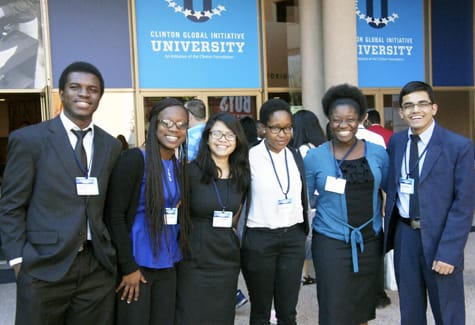Student project earns Clinton Global Initiative University award

Six St. Olaf College students who have developed innovative solutions to global challenges recently presented their ideas at the Clinton Global Initiative University conference, where one earned an award that will support her project in Africa.
Sudip Bhandari ‘14, Love Odetola ‘14, Angela Amoako ‘15, Joseph Adedigba ‘14, Pumla Maswanganyi ‘16, and Theresia Dewi ‘16 traveled to Phoenix, Arizona, to share their plans for improving education, environmental sustainability, and women’s rights around the globe.
Odetola’s presentation earned the Resolution Fellowship award to support her project, which aims to empower women in Senegal.
Launched in 2007 by former President Bill Clinton, the conference brings together world leaders and students with the goal of encouraging action on global issues and engaging the next generation of leaders on college campuses.
Students at the conference explore five focus areas: education, environment and climate change, peace and human rights, poverty alleviation, and public health.
A winning presentation
Odetola’s project aims to build a facility in Senegal to host two programs aimed at supporting female farmers and girls who drop out of high school.
“In Senegal, once you drop out of school, the best alternative is to get married,” Odetola says, noting that less than 25 percent of girls in the country make it through high school. “The facility’s programs will equip them with health advice and business skills so they can either start their own business or try to establish one.”
Since Senegal has a large tailoring market, Odetola wants to focus on programs that will offer business skills around the industry.
“We’re setting up a holistic tailoring center that will partner up with local health NGOs to offer workshops and advice on basic maternal health and prenatal care. We’re also partnering up with entrepreneurship NGOs to offer entrepreneurship business skills — to give the girls the opportunity to start their own business,” Odetola says.
Odetola previously earned a Davis Projects for Peace grant to implement three projects in one village in Senegal: the creation of a water pipe to bring fresh water to the village; the development of multiple public health workshops targeted toward the women of the village; and the establishment of microloans for 10-15 women to develop small business ventures in the field of agriculture and livestock.
Global engagement
Bhandari’s project focused on waste management. He took action this past year by co-founding the Ole Thrift Shop, which takes items that St. Olaf students might otherwise throw away as they move out of the residence halls in the spring and sells them to incoming students in the fall. He plans to expand the scope and reach of Ole Thrift Shop.
Amoako is working on a project called “Neglected No More,” which seeks to provide female head porters in Ghana, popularly known as Kayayei, with access to favorable microcredit to start a business, train them in a skill, and enroll them in schools. Amoako plans to take the girls through workshops to educate them on health and business management.
Both Dewi and Maswanganyi plan to source coffee directly from farming communities in Indonesia and South Africa to create a profit for the farming community. They hope this will be used to improve and develop the farms.
Adedigba’s project focuses on education as well. He plans to collaborate with science institutions in Ghana to create a summer program to encourage young girls to pursue education and careers in the science, technology, engineering, and mathematics fields.
Adedigba previously earned a Finstad Entrepreneurial Grant from the St. Olaf Piper Center for Vocation and Career to design a self-sustaining water well in Saki, Nigeria. He worked with Professor of Biology Anne Walter to plan out and implement the water well in his hometown. The well today provides water to more than 2,500 residents in Saki.